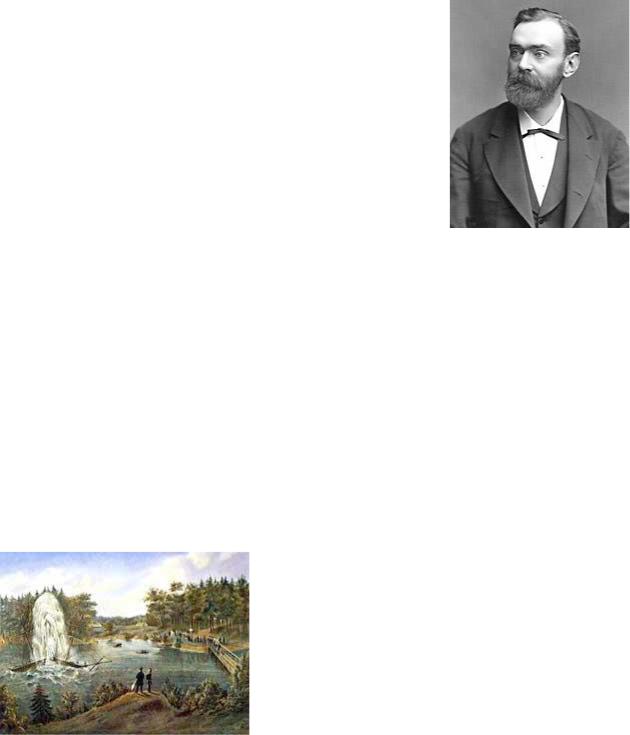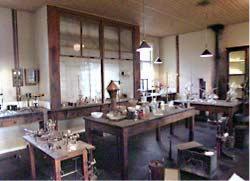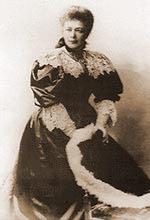
8958
.pdf
Alfred Nobel was born in Stockholm on October 21, 1833. His father Immanuel Nobel was an engineer and inventor who built bridges and buildings in Stockholm. In connection with his construction work Immanuel Nobel also experimented with different techniques for blasting rocks.
Alfred's mother, born Andriette Ahlsell, came from a wealthy family. Due to misfortunes in his construction
work caused by the loss of some barges of building material, Immanuel Nobel was forced into bankruptcy the same year Alfred Nobel was
born. In 1837 Immanuel Nobel left Stockholm and his family to start a new career in Finland and in Russia. To support the family, Andriette Nobel started a grocery store which provided a modest income. Meanwhile Immanuel Nobel was successful in his new enterprise in St. Petersburg, Russia. He started a mechanical workshop which provided equipment for the Russian army and he also convinced the Tsar and his generals that naval mines could be used to block enemy naval ships from threatening the city.
The naval mines designed by Immanuel Nobel were simple devices consisting of submerged wooden casks filled with gunpowder. Anchored below the surface of the Gulf of Finland, they effectively deterred the British Royal Navy from moving into firing range of St. Pe-
tersburg during the Crimean war (1853-1856). Immanuel Nobel was also a pioneer in arms manufacture and in designing steam engines.
Successful in his industrial and business ventures, Immanuel Nobel was able, in 1842, to bring his family to St. Petersburg. There, his sons were given a first class education by private teachers. The training

included natural sciences, languages and literature. By the age of 17 Alfred Nobel was fluent in Swedish, Russian, French, English and German. His primary interests were in English literature and poetry as well as in chemistry and physics. Alfred's father sent him abroad for further training in chemical engineering to widen Alfred's horizons. During a two year period Alfred Nobel visited Sweden, Germany, France and the United States. In Paris, the city he came to like best, he worked in the private laboratory of Professor T. J. Pelouze, a famous chemist. There he met the young Italian chemist Ascanio Sobrero who, three years earlier, had invented nitroglycerine, a highly explosive liquid. Alfred Nobel became very interested in nitroglycerine and how it could be put to practical use in construction work. He also realized that the safety problems had to be solved and a method had to be developed for the controlled detonation of nitroglycerine. Together with his father he performed experiments to develop nitroglycerine as a commercially and technically useful explosive.
He found that mixing nitroglycerine with kieselguhr would turn the liquid into a paste which could be shaped into rods of a size and form suitable for insertion into drilling holes. In 1867 he patented this material under the name of dynamite. To be able to detonate the dynamite rods he also invented a
detonator (blasting cap) which could be ignited by lighting a fuse.
Alfred Nobel's laboratory in Bofors, Sweden.
The market for dynamite and detonating caps grew very rapidly and Alfred Nobel also proved himself to be a very skillful entrepreneur and businessman. By 1865 his factory in Krümmel near Hamburg,
Germany, was exporting nitroglycerine explosives to other countries in Europe, America and Australia. Over the years he founded factories and laboratories in some 90 different places in more than 20 countries.

Intensive work and travel did not leave much time for a private life. At the age of 43 he was feeling like an old man. At this time he advertised in a newspaper "Wealthy, highly-educated elderly gentleman seeks lady of mature age, versed in languages, as secretary and supervisor of household." The most qualified applicant turned out to be an Austrian woman, Countess Bertha Kinsky. After working a very short time for Nobel she decided to return to Austria to marry Count Arthur von Suttner. In spite of this Alfred Nobel and Bertha von Suttner remained friends and kept writing letters to each other for decades. Over the years Bertha von Suttner became increasingly critical of the arms race. She wrote a famous
book, Lay Down Your Arms and became a prominent figure in the peace movement. No doubt this influenced Alfred Nobel when he wrote his final will which was to include a Prize for persons or organizations who promoted peace.
Alfred Nobel's greatness lay in his ability to combine the penetrating mind
Bertha von Suttner.
of the scientist and inventor with the forward-looking dynamism of the industrialist. Nobel was very interested in social and peace-related issues and held what were considered radical views in his era. He had a great interest in literature and wrote his own poetry and dramatic works. The Nobel Prizes became an extension and a fulfillment of his lifetime interests.
Alfred Nobel died in San Remo, Italy, on December 10, 1896. When his will was opened it came as a surprise that his fortune was to be used for Prizes in Physics, Chemistry, Physiology or Medicine, Literature and Peace. The executors of his will were two young engineers, Ragnar Sohlman and Rudolf Lilljequist. They set about forming the Nobel Foundation as an organization to take care of the financial assets left by Nobel for this purpose and to coordinate the work of the entrepreneur -Awarding Institutions.

2.Compare the facts known to you and new information. Discuss this information in pairs.
3.Fill in the cluster with the most important facts from the Alfred Nobel biography. The cluster should contain the key words you can find in the text.
Alfred
Nobel
4.2 Grammar focus
Причастие
Look through the Grammar material (Appendix 3), study the grammar rules and do the following exercises on participle usage.
Ex. 1. Translate different forms of the participle.
Приносящий, принесенный, принося, принеся, переводящий, переве-
денный, переводя, переведя, давая, написав, читающий, берущий, данный,
прочитав, сделанный, пьющий, сказанный, будучи потерянным, нарисовав,
написавший, делая, взятый, взяв, рисуя, выпитый, сделав, идя, пишущий,
прочитанный, дав, рисующий, делающий, нарисованный, выпив, говорящий,
беря, написанный, читая, идущий, дающий, сказав, сидевший, посмотрев, бу-
дучи забыт, строящий, строящийся, играя, поиграв, рассказанный, расска-
завший, видя, принесший, будучи принесенным, построенный, продав.
Ex. 2. Translate into Russian paying attention to the different forms of Parti-
ciple I and Participle II.
1.a) A letter sent from St. Petersburg today will be in Moscow tomorrow. b) He saw some people in the post office sending telegrams.
c) When sending the telegram, she forgot to write her name.
2.a) Some of the questions put to the lecturer yesterday were very im-
portant.
b) The girl putting the book on the shelf is the new librarian.
c) While putting the eggs into the basket, she broke one of them.
3.a) A fish taken out of the water cannot live.
b)A person taking a sunbath must be very careful.
c)Taking a dictionary, he began to translate the text. 4. a) A line seen through this crystal looks double.
b)A teacher seeing a mistake in a student's dictation always corrects it.
c)Seeing clouds of smoke over the house, the girl cried, "Fire! Fire!" 5. a) The word said by the student was not correct,
b) The man standing at the door of the train carriage and saying goodbye to his friends is a well-known musician.
с) Standing at the window, she was waving her hand.
6. a) A word spoken in time may have very important results.
b)The students speaking good English must help their classmates.
c)The speaking doll interested the child very much.
d)While speaking to Nick some days ago, I forgot to ask him about his sis-
ter.
Ex. 3. Chose the necessary form of Participle I or Participle II.
1. a) The girl (writing, written) on the blackboard is our best pupil,
b) Everything (writing, written) here is quite right.
2. a) We listened to the girls (singing, sung) Russian folk songs,
b) We listened to the Russian folk songs (singing, sung) by the girls. 3. a) The girl (washing, washed) the floor is my sister,
b) The floor (washing, washed) by Helen looked very clean.
4.a) Who is that boy (doing, done) his homework at that table? b) The exercises (doing, done) by the pupils were easy.
5.a) The house (surrounding, surrounded) by tall trees is very beautiful, b) The wall (surrounding, surrounded) the house was very high.
6.Read the (translating, translated) sentences once more.
7.Name some places (visiting, visited) by you last year.
8.I picked up the pencil (lying, lain) on the floor.
9.She was reading the book (buying, bought) the day before.
10.Yesterday we were at a conference (organizing, organized) by the pupils of the 10th form.
11.(Taking, taken) the girl by the hand, she led her across the street.
12.It was not easy to find the (losing, lost) stamp.
13.I shall show you a picture (painting, painted) by Hogarth.
14.Here is the letter (receiving, received) by me yesterday.
15.Do you know the girl (playing, played) in the garden?
16.The book (writing, written) by this scientist is very interesting.
17.Translate the words (writing, written) on the blackboard.
18.We could not see the sun (covering, covered) by dark clouds.
19.The (losing, lost) book was found at last.
20.(Going, gone) along the street, I met Mary and Ann.
21.Look at the beautiful flowers (gathering, gathered) by the children.
22.His hat (blowing, blown) off by the wind was lying in the middle of the
street.
23."How do you like the film?" he asked, (turning, turned) towards me.
24.When we came nearer, we saw two boys (coming, come) towards us.
25. I think that the boy (standing, stood) there is his brother.
Ex. 4. Translate into Russian paying attention to the function of the partici-
ple.
1. Keeping in mind the topography, the weather, and the length of the hike, decide what you need to take. 2. You shouldn't waste time analyzing that old matter. 3. Looking at her, we decided to say nothing for the moment. 4. On the way back home she talked about other things, wishing to distract her sister from the current troubles. 5. Yesterday I racked my brains, trying to remember the title of the book Kate recommended me. 6. She noticed a handsome young man standing near her door. 7. He sat for a long time thinking about his future journey. 8. Nigeria is a living zoo. 9. Let sleeping dogs lie. 10. People ran in and out of the house, shouting and crying. 11. Sally spends all her time going to parties. 12. Maxim gave the photographs a last lingering glance before running to the door. Picking up his suitcase, he took a deep breath and went out.13. The conference taking place at the university is devoted to problems of nuclear physics. 14. The man standing at the time table was our teacher last year. 15. The people having waited for you have just gone. 16. Being asked what he thought of the innovation, the engineer said he approved of it. 17. Having been examined by the customs, the goods were let through.18. Changed into his uniform, he looked younger and slimmer. 19. Arrived at the ship, the passengers were shown their cabins. 20. Finished with his breakfast, he remained for some time at the table, looking through the newspapers. 21. The book referred to in this paper was published last year. The data obtained can be relied upon. 22. The experiment followed by a lecture was carried out by our professor’s assistant. 23. His report followed by a paper on the same subject dealt with many problems of importance. 24. The session attended by foreign delegates was held on the first of November.
Ex. 5. Translate into Russian paying attention to the objective participial construction.
1. I watched him standing at door of his shop. 2. They spent last Friday listening to the Ministers telling the trade union leaders that it is right for workers to hold back on wage claims. 3. We hope to see this issue raised in all trades councils, in every union conference. 4. They saw their view point being taken increasingly into account by the White House. 5. We have observed bodies being charged by friction. 6. I felt him looking at me now and again. 7. I noticed the doctor frowning. 8. I had never before seen the game played.
Ex. 6. Translate into Russian paying attention to the causative forms of the participle.
1. I slaved all my life to have my sons educated. 2. The king had the conspirators shot. 3. If you leave the door open, you will have your house robbed. 4. He is so slow that he never gets his work done. 5.1 had my foot caught in the door and couldn't get it free. 6. It took four men to have the piano removed to the upper floor. 7. He wanted a government freely chosen by the will of the people. 8. They got the project endorsed. 9. These departments have their production schedules unified. 10. The porous partition keeps the solutions separated. 11. They have the program debugged. 12. We have our research group presented at the last symposium. 13. They would like to have the results of their experiments put into practice.
Ex. 7. Translate into Russian paying attention to the absolute participial construction.
1. My colleague being away, I had to take the decision myself. 2. Weather permitting, the astronomer will proceed with his observation. 3. The signal given, the rocket starts immediately. 4. The astronomer proceeded with this observation,

the sky having cleared. 5. They walked in the cold night, fresh snow crunching noisily underfoot.
1. There being many people in the conference hall, we could not enter it. 2. The sodium atom has eleven electrons, the eleventh one occupying a position outside the second shell. 3. Bans of trade lifted, political atmosphere in the world will improve at once. 4. She ran up the stairs, her heart thumping painfully. 5. With the experiments having been carried out, we started new investigations.
Unit 5 GLOBALIZATION
5.1 Is globalization a good thing
Reading and listening
-Do you know what globalization is?
-What positive effect does it give?
-What is negative about globalization?
Read several opinions and compare
your point of view concerning
globalization.
Is globalisation a good thing?
Globalisation is definitely about progress, к leads to better products, which are more cost effective to produce and therefore cheaper for everyone. It's about consumer choice. Globalisation also connects people by means of communication and offers them new opportunities for travel, work and education. It means a faster rate of development for the whole world. Many poorer countries have benefited from investment as a result of globalization.
Mike, USA

The global economy simply means sweatshops In poor countries so that rich countries can have cheap goods. There is a lot of inequality involved in globalisation and the desire for cheaper products. It also leads to the destruction of natural resources. Globalisation benefits the rich nations, who control prices, who influence the economies of poor countries and cause populations to migrate in order to try and improve their lives.
Cindy, China
Globalisation is just another aspect of evolution. It is a new name for an old process. Surely the coming of the railways and industrialisation hundreds of years ago was globalisation. It enables products to be produced wherever it is most efficient to do so. I think it means great social and economic progress for developing countries. I don't understand this anti-globalisation movement and feeling. Surely free markets and the free movement of people, goods and services are beneficial to economies all over the world?
Ingrid, Germany
Globalisation's only good for those who arc already economically strong. It's tile big multinational companies who really benefit, and it worries me that sometimes they seem to have more power and influence over our lives than elected governments. Some of them are actually richer than whole countries, which must be a bad thing.
Marco, Italy
Complete the chart for the first four messages.
Opinions Are they for Give reasons or against
globalization?
Mike
Cindy
Ingrid
Marco
